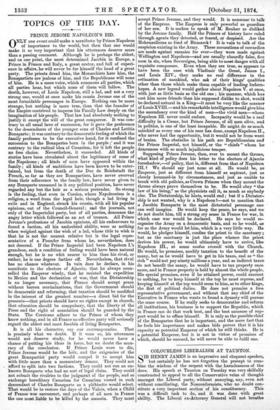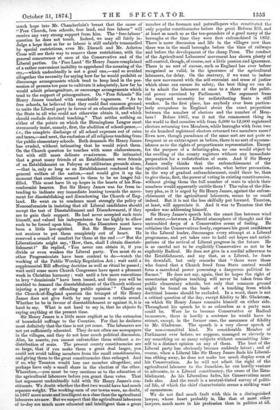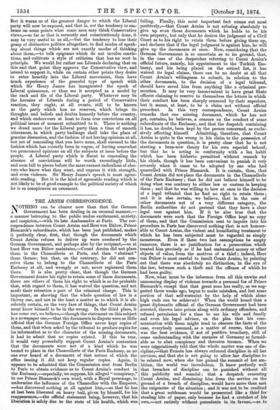COLOURLESS LIBERALISM AT TAUNTON.
SIR HENRY JAMES an impressive and eloquent speaker, but i certainly he has not forgotten the precept to com- bine the wisdom of the serpent with the harmlessness of the dove. His speech at Taunton on Tuesday was very skilfully constructed to appeal to all the Conservative veins of thought amongst the Liberal party, without annoying, nay, even not without conciliating, the Nonconformists, who no doubt con-
stitute a very important section of his constituency. This was a difficult task to do, and it was done with great ability. The Liberal ex-Attorney General will not breathe
are to gain their support. He had never accepted such tests Sir Henry James's speech hits the exact line between wind himself, and valued his independence far too highly to allow and water,—between a Liberal atmosphere of thought and the such to be forced upon him. Here, the Dissenters must have untroubled deeps of a Conservative ocean of feeling. He
injuring a party or offending public opinion." Clearly on might be found on the basis of a teaching from which the Church-of-England question the trumpet of Sir Henry doctrinal lessons should be excluded. In a word, there is not James does not give forth by any means a certain sound. a critical question of the day, except fidelity to Mr. Gladstone,
Whether he be in favour of disestablishment or against it, it is on which Sir Henry James commits himself on either side. hard to say. What is not hard to say is, that he objects Lo Throughout his speech he is as colourless as a party man
saying anything at the present time, could be. Were he to become Conservative or Radical Sir Henry James is a little more explicit as to the extension to-morrow, there is hardly a sentence he would have to of household suffrage to the Counties. For that he declares retract, except, in the former case, the assurance of fidelity most definitely that the time is not yet come. The labourers are to Mr. Gladstone. The speech is a very clever speech of not yet sufficiently educated. They do not often see newspapers the non-committal kind. No considerable Member of in the villages, and they do not hear much political discussion. Parliament ever before, we suppose, managed so cleverly to Also, he asserts, you cannot enfranchise them without a re- say something on so many subjects without committing him- distribution of seats. The present county constituencies are self to a distinct opinion on any of them. The heat of the so large, that if you make them a great deal larger, you Liberal party has obviously become suddenly latent ; and of could not avoid taking members from the small constituencies, course, when a Liberal like Sir Henry James finds his Liberal- and giving them to the great constituencies thus enlarged. And ism ebbing away, he does not make too much display even of if so, why Taunton wciuld lose one member altogether, and his Conservatism. As he will not admit the right of the perhaps have only a small share in the election of the other, agricultural labourer to the franchise, he can hardly venture Wherefore,—you must be very cautious as to the education of to advocate, to a Liberal constituency, the cause of the Eats.-
the agricultural labourers before you grant them votes. That blishment. As his Liberalism fades his Conservatism must last argument undoubtedly told with Sir Henry James's con- fade also. And the result is a neutral-tinted survey of politi- stituents. We doubt whether the first two would have had much cal life, of which the chief characteristic seems a striking want separate weight. The working-men of our towns were, no doubt, of earnestness.
in 1867 more acute and intelligent as a class than the agricultural We do not find much fault with this in a distinguished labourers are now. But we suspect that the agricultural labourers lawyer, whose heart probably is, like that of most other of to-day are much more educated and intelligent than a great lawyers, much more in his profession than in politics at all.
much hope into Mr. Chamberlain's breast that the cause of number of the freemen and potwallopers who constituted the " Free Church, free schools, free land, and free labour" will only popular constituencies before the great Reform Bill, and receive any very strong support from him. The ' free-labour ' at least as much so as the ten-pounders of a good many of the question he does not touch. Indeed, we may all fairly in- boroughs at the time they were first enfranchised in 1832. dulge a hope that so far as labour is still unfairly trammelled There is more discussion and life in the villages now than by special restrictions, even Mr. Disraeli and Mr. Asheton there was in the small boroughs before the time of railways Cross will see their way to remove these restrictions, with the and before the development of the cheap Press. The conduct general concurrence at once of the Conservative and of the of the Agricultural Labourers' movement has shown plenty of Liberal parties. On 4Free Land ' Sir Henry James complained self-control, though, of course, not a little passion and ignorance. of a rather convenient inability to apprehend the meaning of the There is no sort of excuse such as England has ever before exy,—which undoubtedly is not a good one,—and so avoided recognised as valid, in the ignorance of the agricultural altogether the necessity for saying how far he would prohibit or labourers, for delay. On the contrary, if we want to imbue discourage arrangements which tend to keep land in the pos- the new movement with the self-restraint and sense of justice session of persons too poor to cultivate it adequately, how far he which alone can ensure its safety, the best thing we can do would admit primogeniture, or encourage arrangements which is to admit the labourers at once to a share of the politi- tend to the support of primogeniture. On "Free Schools" Sir cal power exercised by Parliament. The argument from Henry James touched with remarkable vagueness. " As to the supposed necessity for redistributing Seats is still free schools, he believed that they could find common ground weaker. In the first place, has anybody ever been particn- to unite the Liberal party in favour of an education afforded by larly scrupulous in England about the exact proportion the State to all who could not otherwise obtain it, and which between the number of electors and the number of Mem- should exclude doctrinal teaching." That settles nothing on bers ? Before 1867, was it not the commonest thing in either of the points on which the Birmingham League most the world to find counties with from 6,000 to 12,000 registered strenuously insist, namely, first, the abolition of school-pence,— electors returning two Members, while boroughs with from two i.e., the complete discharge of all school expenses out of rates to six hundred registered electors returned two members more? and taxes,—and next, the exclusion of all religious teaching from Even now, though paradoxes of the same sort are not quite so the public elementary schools. Both demands Sir Henry James frequent or so extravagant as before, there is no sort of squeam- has evaded, without intimating that he would reject them. ishness as to the rights of proportionate representation. Except On the Church question he touches with some elaborateness, for the purpose of a debating-plea, no one would object to but with still more delicate evasiveness. He intimated the swelling of the county registers without any immediate that a great many friends of an Establishment were friends preparation for a redistribution of seats. And if Sir Henry of an Establishment on Paleyan or utilitarian grounds alone, James really thinks that the enfranchisement of the —that is, only so long as an Establishment conduced to the agricultural labourers needs caution, what better precaution, general welfare of the nation,—and would give it up the in the way of gradual enfranchisement, could there be, than moment that condition seemed to them to be no longer ful- to give them, first, the power of voting in existing constituencies, filled. This must have lit up hopes in the hearts of his Non- without giving them the full number of seats to which their conformist hearers. But Sir Henry James was far from in numbers would apparently entitle them ? The value of the dila- tending to indicate any immediate leaning towards the move- tory plea, as it is urged by Sir Henry James, against the enfran- ment for disestablishing and disendowing the Church of Eng- chisement of the agricultural labourers, seems to us small land. He went on to condemn most strongly the policy of indeed. But it is not the less skilfully put forward. Taunton, Nonconformists in insisting that all Liberal candidates should at least, will appreciate it. And it was to Taunton that the accept the test of Disestablisment and Disendowment, if they speaker was addressing himself.
been a little low-spirited. But Sir Henry James was criticises the Conservatives freely, expresses his great confidence not anxious to put them completely out of heart. He in the Liberal leader, discourages every attempt at a Liberal reserved a crumb of comfort for them at the end :—" But the programme, and yet takes care to hold out hopes and andel- Liberationists might say, 'How, then, shall I obtain disestab- pations of the revival of Liberal progress in the future. He lishment ?' He replied, You never can obtain it, if you is as careful not to be explicitly Conservative as not to be divide or even weaken the Liberal party. You must do as explicitly Radical. He does not give in a cordial adherence to other Progressionists have been content to do—watch the the Establishment, and say that, as a Liberal, he fears working of the Public Worship Regulation Act ; wait until a its downfall, but only remarks that "there were those supplemental Bill affecting doctrine as well as ritual be passed ; who feared that a Church freed from State control would wait until some more Church Congresses have spent a pleasant form a sacerdotal power possessing a dangerous political in- week in Christian harmony ; wait until a few more executions fluence." He does not say, again, that he hopes the right of to levy "dominicals " have been issued, and then you will be unsectarian religious teaching will never be taken from the enabled to demand the disestablishment of the Church without public elementary schools, but only that common ground ,
But it warns us of the greatest danger to which the Liberal party will now be exposed, and that is, not the tendency to em- brace on some points what some men may think Conservative views,—so far as that is earnestly and conscientiously done, it may be very useful to US all,—but the tendency to lose their grasp of distinctive politics altogether, to find modes of speak- ing about things which are not exactly modes of thinking about them,—to talk epigrams which do not involve convic- tions, and cultivate a style of criticism that has no root in principle. We would far rather see Liberals declaring that on this and that point they approve the Conservative view, and intend to support it, while on certain other points they desire to enter heartily into the Liberal movement, than have much experience of the graceful type of speech with which Sir Henry James has inaugurated the epoch of Liberal quiescence, or than see it accepted as a model by the rank and file of the Liberal party. Whatever may be the heresies of Liberals during a period of Conservative reaction, they ought, at all events, still to be known as the party which has no reserves, which brings its thoughts and beliefs and doubts honestly before the country, and which endeavours at least to form true convictions on all political issues of moment submitted to it. There is nothing we dread more for the Liberal party than a time of smooth utterances, in which party badinage shall take the place of genuine discussion, and the fashion of not having opinions at all, but yet- of concealing that you have none, shall succeed to the fashion which has recently been in vogue, of having somewhat too pronounced opinions on all the subjects at issue before the people. A Liberal party which is fluent in concealing the absence of convictions will be worth exceedingly little, and soon fall to pieces before the more earnest radicalism of elec- tors who know what they want, and express it with strength, and even violence. Sir Henry James's speech is most agree- able reading. But it is the kind of agreeable reading which is not likely to be of good example to the polities1 society of which he is so conspicuous an ornament.








































 Previous page
Previous page